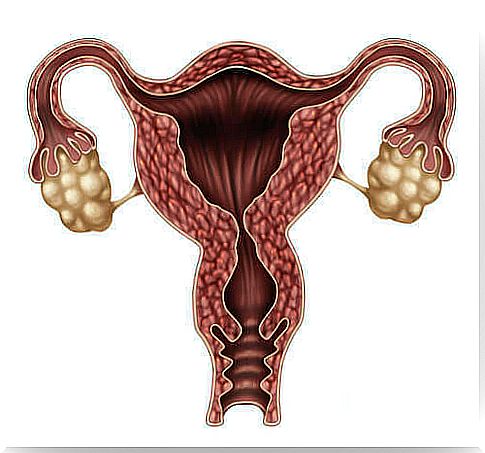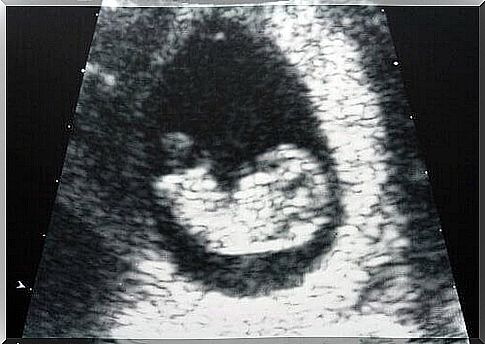Interim Bleeding: What Does It Mean?

Vaginal bleeding when a woman has not had her period is also called interim bleeding. It usually serves as a warning to the woman experiencing it. This is because it can be a symptom of a more serious problem, which has to do with the reproductive system.
Interim bleeding is not considered normal. However, it is also not very uncommon. Fortunately, it does not always indicate a potentially serious condition.
However, it is important that all women are well informed about this topic and its possible causes. This way you can prevent yourself from immediately thinking about the most serious possibilities.
Everything about interim bleeding

A normal menstrual cycle lasts between twenty-one and thirty-five days, with an average of twenty-eight days. A normal period lasts between two and seven days. During this period, a woman loses between 30 and 80 ml of blood.
We speak of abnormal bleeding if a woman loses blood during the period between the last day of her previous period and the first day of her next period.
However, it is true that almost all women in the fertile phase of their lives will suffer from interim blood loss at some point. Fortunately, in most cases, it’s nothing to worry about.
Nevertheless, health professionals and gynecologists recommend that you always consult your doctor if you experience this symptom. It could be an indication of a more serious problem such as cancer or a preliminary stage of cancer.
What can cause interim bleeding?
Ovulation

Ovulation is one of the possible causes of abnormal blood loss between periods. When you are ovulating, your body makes more estrogen. Estrogen is a hormone associated with ovulation.
This increase in estrogen can cause you to suffer from interim bleeding. This is especially important when you notice that this blood loss occurs during the thirteenth to the sixteenth day of your menstrual cycle.
When ovulation is the cause of the blood loss, the blood is usually pink or brownish in color. Sometimes it is accompanied by cervical mucus and cramps in the lower abdomen.
stress
Physical and mental stress can also be related to the development of interim blood loss.
During periods when you experience a lot of tension and stress, your brain receives stimuli in certain ways. This can then affect your normal menstrual cycle. This can cause you to suffer from brownish discharge. This occurs in the days just before and just after your period.
Pregnancy

It is not at all uncommon for a woman to not immediately realize that she is pregnant. She may not find out until she visits the doctor. That appointment is often made because she suffers from interim blood loss.
During the first weeks of pregnancy, a woman may experience unexplained bleeding. This sometimes happens when the embryo implants in the uterus.
Nevertheless, it is important to consult your home aers in this case. Blood loss during pregnancy can also be a sign of miscarriage.
When should interim bleeding be considered an emergency?
In case you suffer from:
- heavy blood loss
- bleeding that is heavier than your period
- the blood is deep red, black or brown in color
- accompanied by other symptoms such as sweating, dizziness, arrhythmia or abdominal pain
It is then important to immediately seek medical help.
If you lose a lot of blood, this can indicate a fibroid. There is then no question of more blood loss than you normally lose when you have your period.
In any case, a great deal of blood loss between periods is best diagnosed through a medical examination.
In this way, the doctor can determine whether the cause can be found in the cervix, uterus or vagina.
What does it mean if you suffer from interim bleeding after the menopause?

When a woman stops having her period at a certain age, this is an indication that her body has reached the menopause.
However, if a woman suddenly suffers from minor bleeding or heavy bleeding after the menopause, this can be a warning sign. The blood loss then indicates a certain health problem.
A fibroid or polyp can cause this type of blood loss. In many cases, however, it is unfortunately an early symptom of cancer or a pre-cancerous condition.
What investigations should be performed?
One of the most common examinations performed in the case of gynecological abnormalities is a Pap smear.
The results of this examination are used to determine the cause of the blood loss. It can be caused by a problem in the uterus, but there can also be cancerous cells in the cervix.
An ultrasound is a very sensitive way to detect changes in the uterus or ovaries.
A hysteroscopy can also be done. This happens when the other investigations are not sufficient to remove all doubts.
During this examination, a small camera is inserted into the woman through the vagina. This allows the doctor to get a better look at the uterus.









